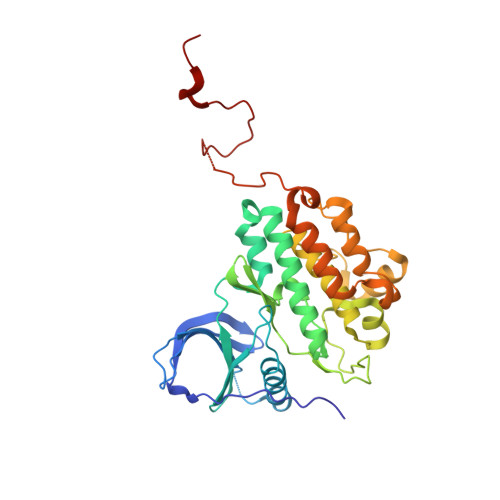Discovery of a Furanopyrimidine-Based Epidermal Growth Factor Receptor Inhibitor (DBPR112) as a Clinical Candidate for the Treatment of Non-Small Cell Lung Cancer.
Lin, S.Y., Chang Hsu, Y., Peng, Y.H., Ke, Y.Y., Lin, W.H., Sun, H.Y., Shiao, H.Y., Kuo, F.M., Chen, P.Y., Lien, T.W., Chen, C.H., Chu, C.Y., Wang, S.Y., Yeh, K.C., Chen, C.P., Hsu, T.A., Wu, S.Y., Yeh, T.K., Chen, C.T., Hsieh, H.P.(2019) J Med Chem 62: 10108-10123
- PubMed: 31560541
- DOI: https://doi.org/10.1021/acs.jmedchem.9b00722
- Primary Citation of Related Structures:
6JZ0 - PubMed Abstract:
Epidermal growth factor receptor (EGFR)-targeted therapy in non-small cell lung cancer represents a breakthrough in the field of precision medicine. Previously, we have identified a lead compound, furanopyrimidine 2 , which contains a ( S )-2-phenylglycinol structure as a key fragment to inhibit EGFR. However, compound 2 showed high clearance and poor oral bioavailability in its pharmacokinetics studies. In this work, we optimized compound 2 by scaffold hopping and exploiting the potent inhibitory activity of various warhead groups to obtain a clinical candidate, 78 (DBPR112), which not only displayed a potent inhibitory activity against EGFR L858R/T790M double mutations but also exhibited tenfold potency better than the third-generation inhibitor, osimertinib, against EGFR and HER2 exon 20 insertion mutations. Overall, pharmacokinetic improvement through lead-to-candidate optimization yielded fourfold oral AUC better that afatinib along with F = 41.5%, an encouraging safety profile, and significant antitumor efficacy in in vivo xenograft models. DBPR112 is currently undergoing phase 1 clinical trial in Taiwan.
Organizational Affiliation:
Institute of Biotechnology and Pharmaceutical Research , National Health Research Institutes , 35 Keyan Road , Zhunan, Miaoli County 35053 , Taiwan , ROC.















